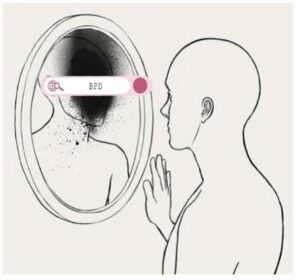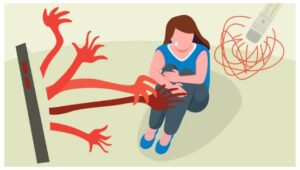Relational trauma isn’t just a wound; it’s a ghost that lingers, whispering in the background whenever you try to get close to someone. It’s the kind of pain that sneaks in through the cracks, because the person who hurt you is the same one who once tucked you in at night or told you they loved you. Wild, right? The world can’t see the bruise, but you feel it every time your heart races at the sound of a raised voice, or you find yourself zoning out during an argument that isn’t even that serious. Your nervous system? Yeah, it’s basically running on Windows 95, slow, glitchy, and terrified of crashing. Healing’s not a sprint, or even a marathon. More like learning to ride a bike again, except the bike is your own damn feelings and you’re not sure you trust the handlebars yet.
When Love and Harm Came From the Same Place
Getting hurt is one thing. But when the person you trusted to have your back is the same one stabbing you in it? That’s a plot twist nobody asked for. Suddenly, love feels like a game show where the buzzer could go off at any second, and you have no idea what the rules are. Psychologists have a fancy term for it, disorganized attachment. Basically, your brain’s trying to build a house on quicksand: sometimes you get hugs, sometimes you get the cold shoulder, and sometimes you get both in the same afternoon. It’s chaos in a cardigan.
And here’s the kicker: this stuff can be invisible. No shouting matches, no dramatic scenes. Sometimes it’s just a look, a sigh, or affection that comes with a weird sense of owing someone something. Like that story from Reddit, the kid whose mom only said “I love you” after straight A’s. Imagine growing up thinking love is a prize, not a birthright. Messed up, right?
Maybe you were told you were “too sensitive.” Maybe you learned to make yourself small so you didn’t get in the way. Maybe silence was used as a weapon, or comfort was something you had to earn by performing, smiling, or just not being a bother. Before you know it, you’re a grown-up with a nervous system that treats every hug like it might be a trap. You want connection, but your body’s bracing for impact. It’s like trying to relax in a haunted house, good luck with that.
Signs You Might Be Living with Relational Trauma
Relational trauma often hides in your patterns, not your memories.
You might notice:
- Constantly second-guessing your feelings or perception
- Fearing abandonment even in stable relationships
- Feeling like you’re “too much” for people to love
- Tolerating disrespect to avoid conflict
- Chasing people who don’t choose you back
- Struggling to name or express your needs
- Panicking when relationships feel too close, or too distant
These are not personality flaws. These are protective patterns, survival instincts learned in unsafe environments. They once helped you survive.
Now, they can be unlearned, slowly and safely, in spaces where your nervous system can finally relax.
Busting the Myth: “You Can Just Choose Better People”
Look, if I had a dollar for every time someone said, “Just pick better partners,” I’d probably own a small island by now. It’s wild how much people think healing is just about picking the “right” people, like you’re at a grocery store choosing apples instead of trauma. But here’s the kicker, healing’s not about who did what. It’s about what your body and brain soaked up along the way. You can say with all your might that you want the good stuff, love, safety, all that, but if deep down your nervous system thinks getting close means getting hurt? Well, good luck letting anyone in.
Maybe you learned somewhere along the line that love = anxiety, or that saying what you need means you’ll get punished, or maybe that shrinking yourself is the only way to keep people around. I read this one story on Reddit, this person was always the “easygoing one,” bending over backwards, panicking if someone even hinted at leaving. Turns out, that wasn’t about picking the wrong people. It was just their trauma running the show, picking for them.
So yeah, it’s not about willpower or blaming yourself for “bad choices.” It’s old wiring, old emotional blueprints. Real healing? That starts on the inside, not by trying to swap out your entire contact list.
The Inner Dialogues of Relational Trauma
Here’s the thing about relational trauma, it leaves you with this low-key playlist of thoughts looping in your head. Stuff like, “I have to be low-maintenance or they’ll bail,” or, “If I speak up, I’ll get punished.” These aren’t random. They show up because somewhere along the way, someone made love and acceptance feel conditional. Maybe you had a parent who only hugged you when you were quiet, so now grown-up you is terrified to ask for what you need.
That inner monologue? It’s sneaky. Even when things are fine, it’s whispering that disaster’s just around the corner. And honestly, that stuff sticks, big time.
But healing isn’t just a pep talk. It means poking at those beliefs, actually getting curious about why they’re there. Eventually, you start to realize, “Hey, wanting support doesn’t make me a burden,” or “Crying doesn’t mean I’m too much.” Sometimes, being “sensitive” is just a sign you learned to survive.
What Healing Relational Trauma Might Look Like
Nobody’s saying you have to forgive and forget or pretend nothing happened. Healing’s really about building a new sense of safety inside yourself, especially around other people. Sometimes, that takes ages. Sometimes, you backslide. Totally normal.
- Learning to Feel Without Fear
One of the first things you gotta do is figure out how to feel stuff without going full tilt into panic mode. In therapy, you learn to notice, “Oh, I’m sad,” without immediately bracing for disaster. There’s even brain science behind this, trauma can make your brain super jumpy.
You start to realize, sadness isn’t weakness, anger doesn’t mean abandonment’s coming, and joy isn’t always a setup for disappointment. I heard about this woman who, for the first time ever, cried in front of her therapist and didn’t say sorry afterward. She said it changed everything. Just feeling, no apology. That’s the good stuff.
- Repairing the Inner Relationship First
A lot of us have these inner rules, like, “If I don’t keep everyone happy, I’ll end up alone.” Honestly, those rules got programmed way back when. In IFS therapy, they call them “parts”, these bits of you that try to keep you safe by making you invisible or agreeable.
The trick isn’t to go to war with those parts. It’s to get curious, even a little compassionate. I saw a Reddit post where someone realized their people-pleasing “part” was just trying to keep them from being ditched. Not evil, just scared. You don’t have to erase these parts; just stop letting them drive the bus.
- Building Boundaries Without Guilt
If you grew up thinking your worth depends on being easy or agreeable, saying “no” can feel like you’re committing a crime. But boundaries aren’t about building walls, they’re more like building a bridge back to yourself. It’s basically you saying, “I get to be me, and still belong.”
Boundaries help you break out of old loops. They make things predictable and give you a choice, stuff trauma usually steals. Learning to say “no” without feeling like a monster, and “yes” because you want to, not because you’re scared? That’s where the magic happens. And yeah, it takes practice, but it’s worth it.
A Mini Real-Life Example: Meera’s Story
So Meera, She was always that “chill” friend, the one who never made a fuss, just went along with whatever, barely asked for anything. Honestly, she figured if she took up too much space, people would just drift away. Not exactly a wild guess, either, her early relationships kinda taught her that if she dared to show she was sad or mad, she’d just end up alone.
Fast forward to therapy: Meera starts digging around in her own history and finds this younger version of herself, the one who picked up on the idea that love always came with strings attached. That kid inside? Didn’t need to be told to shut up. She actually needed some freaking attention, maybe a little love, and a heck of a lot of patience. So Meera starts with little things, ordering what she actually wants when out for dinner (who knew you could just do that?), bailing on plans she doesn’t vibe with, letting herself ugly-cry and not apologizing for it.
These days, “chill” isn’t an act for survival anymore. She says “no” and means it. She says “yes” when she actually wants to. And when she claims, “I matter,” she’s not looking for someone else to stamp it official, it’s just true, deep in her bones.
Why Relational Trauma Heals in Relationship
Here’s the thing: when people are the problem, people gotta be part of the solution. You don’t need some perfect human who never screws up (good luck finding that, anyway). What you really need is someone who actually pays attention, who doesn’t shrink your feelings, doesn’t speed through your story, and just… holds space for you. That’s what therapy is supposed to feel like, honestly.
Especially if you’ve been burned by relationships before, trust isn’t built with fancy words. It’s about someone showing up again and again, making you feel safe, giving a damn, and not bailing when things get messy. That’s how we see things at Coach For Mind, at least, our trauma-informed therapists in India totally get how deep that pain can run. So we don’t force you to hurry up and “get better” already. We walk alongside you, on your terms, at your pace. Always with respect. Always with your dignity.
Nobody heals because someone told them to hurry up. Healing shows up when people do, when they’re just there. That’s it
Visit www.coachformind.com to begin your journey with a therapist who understands.
FAQ: Healing Relational Trauma
What is relational trauma?
Let’s break it down: as a child, the people you rely on for stability, parents, caregivers, whoever’s in charge, can sometimes be the very source of ongoing stress. This isn’t about an occasional disagreement; it’s a pattern. Mixed messages, harsh criticism, emotional distance, or even just a pervasive sense of emptiness. The impact? It’s not just psychological; it becomes ingrained in your response to the world. Your brain develops an internal alarm system, constantly scanning for threats, even when things appear calm. That’s relational trauma. It reshapes your sense of safety, makes trust difficult, and turns peace into something that feels suspicious.
Can relational trauma happen without physical abuse?
Absolutely. Physical wounds aren’t a prerequisite for deep, lasting harm. In fact, some of the most significant damage is invisible. There may never be a raised hand, but emotional blows, being dismissed, ignored, manipulated, or made to feel like your emotions are a nuisance, leave lasting scars. The body doesn’t distinguish between a physical threat and a psychological one; the stress response is the same. Research (Teicher & Samson, 2016) confirms that emotional neglect can significantly disrupt self-trust and emotional regulation. Externally, someone might seem composed, but internally, there can be substantial turmoil.
Why do I keep ending up in unhealthy relationships?
It’s a common issue, and it’s not simply coincidental. If your early environment was chaotic, your nervous system adapts, and that sense of chaos starts to feel familiar, even comfortable. As a result, people often repeat unhealthy relationship patterns, subconsciously seeking out what’s familiar. Change requires conscious effort: self-reflection, identifying problematic patterns, and learning to recognize warning signs. With intentional work, you can break the cycle and make more empowered choices in relationships.
Can relational trauma affect a healthy relationship?
Definitely. When you finally encounter someone who treats you with respect and kindness, it can trigger anxiety and second-guessing. Your mind may search for hidden problems, you might become overly cautious, or misinterpret benign gestures as potential threats. This isn’t a sign of being “broken”, it’s an understandable response rooted in past experiences. Many individuals with difficult childhoods experience this. The good news is that, with healing, you can start to recognize these patterns and gradually build new, healthier ways of relating to others. Progress may not be linear, but meaningful change is possible.
What kind of therapy helps with relational trauma?
Relational trauma requires targeted, evidence-based approaches. Internal Family Systems (IFS) helps you address the different internal parts shaped by past experiences. Eye Movement Desensitization and Reprocessing (EMDR) allows you to process and integrate difficult memories. Somatic therapies (e.g., Sensorimotor Psychotherapy, Somatic Experiencing) can help regulate the body’s stress response. Attachment-focused therapy provides a framework for building safe, reliable relationships in a therapeutic setting. While these therapies do not erase past experiences, they can equip you with tools to move forward and create a more secure, fulfilling future.
How do I stop people-pleasing or over-giving?
Let’s be honest, people-pleasing isn’t just a harmless habit. For a lot of us, it started as a way to keep the peace or avoid conflict when we were younger. Problem is, that kind of “keep everyone happy” routine follows you into adulthood and, suddenly, your calendar’s packed with stuff you don’t even care about. Breaking the cycle starts with actually acknowledging your own needs and being willing to say “no” when something doesn’t serve you. It’s uncomfortable at first, but it’s necessary. Over time, you realize you don’t have to earn respect or love by constantly giving in. Your value in the workplace, or anywhere else, isn’t measured by how much you sacrifice for others.
How long does it take to heal?
There’s no quick fix for this kind of thing. Healing from relational patterns or workplace burnout isn’t a linear process; it comes with ups and downs. You’ll have days where you set boundaries confidently, and others where you slip back into old habits. That’s normal. Even small improvements, like speaking up in a meeting or politely declining extra work, are signs you’re moving in the right direction. Studies confirm that consistent effort leads to real change over time (Schore, 2017). What matters isn’t how fast you move, but that you keep moving. Realistically, it could take months or even years to see lasting results, but every step counts.
How does Coach For Mind support relational trauma healing?
At Coach For Mind, our professionals are trained in trauma-informed, evidence-based approaches that prioritize psychological safety and trust. We understand that building confidence and setting boundaries, whether in your personal life or at work, is a process that can’t be rushed. We meet you where you are, at your own pace. Sessions aren’t just about revisiting your past; they’re about equipping you with tools to advocate for yourself in the present. Whether you’re navigating difficult workplace dynamics or working on personal boundaries, we’re here to support you, no judgment, just consistent guidance and expertise.
You may not have received the support you needed in the past.
But now, the opportunity for real growth and authentic connection is still very much within reach. You’re allowed to pursue it, and to receive it.












